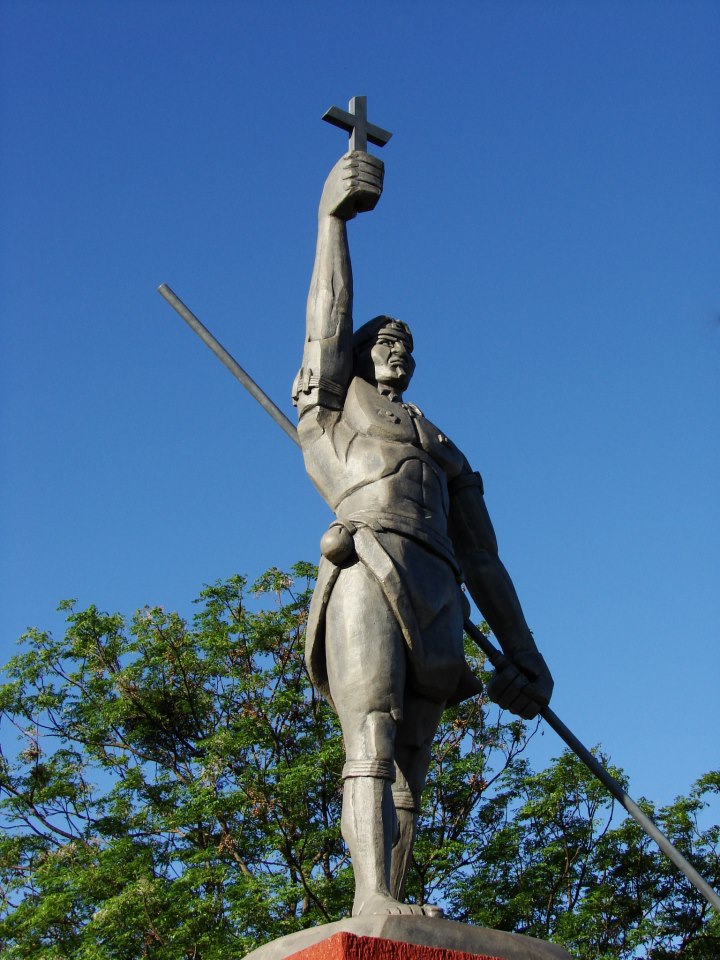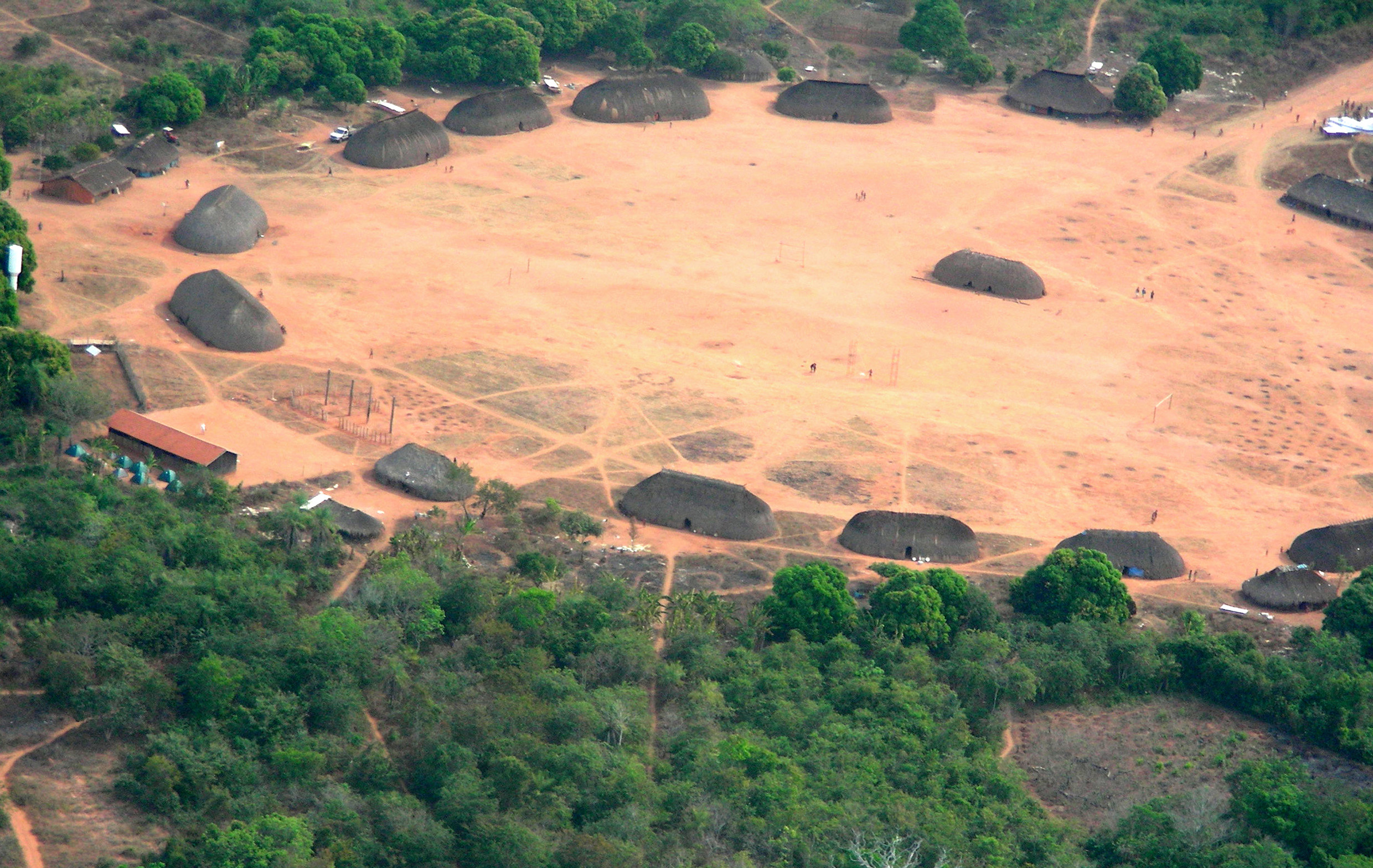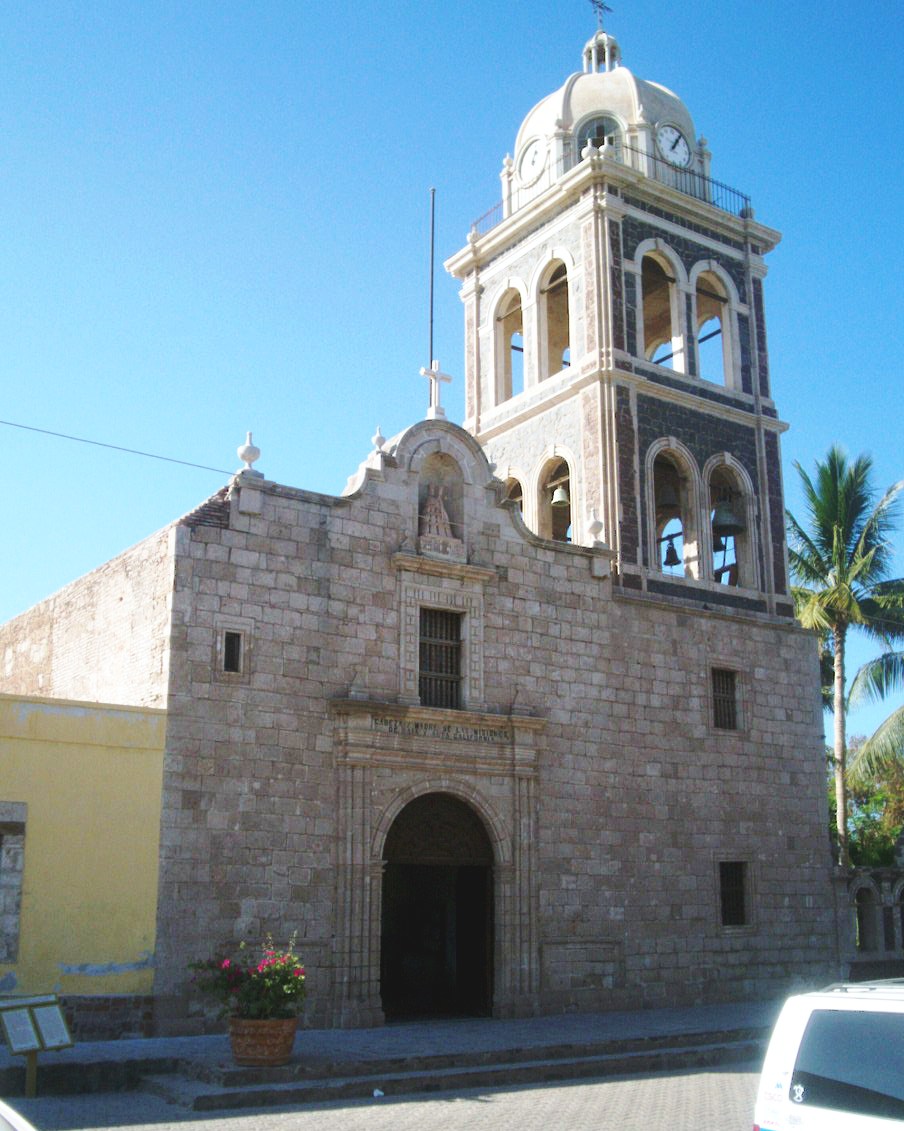|
Bandeiras
The ''Bandeirantes'' (), literally "flag-carriers", were slavers, explorers, adventurers, and fortune hunters in early Colonial Brazil. They are largely responsible for Brazil's great expansion westward, far beyond the Tordesillas Line of 1494, by which Pope Alexander VI divided the new continent into a western, Castilian section, and an eastern, Portuguese section. The ''bandeirantes'' were also known as Paulistas and Mamelucos. They mostly hailed from the São Paulo region, called the Captaincy of São Vicente until 1709 and then as the Captaincy of São Paulo. The São Paulo settlement served as the home base for the most famous ''bandeirantes.'' Some ''bandeirante'' leaders were descendants of first- and second-generation Portuguese who settled in São Paulo, but the bulk of their numbers was made of people of mameluco background (people of both European and Indian ancestries) and natives. Miscegenation was the norm in that society, and its initial family structure was po ... [...More Info...] [...Related Items...] OR: [Wikipedia] [Google] [Baidu] |
Colonial Brazil
Colonial Brazil ( pt, Brasil Colonial) comprises the period from 1500, with the arrival of the Portuguese, until 1815, when Brazil was elevated to a kingdom in union with Portugal as the United Kingdom of Portugal, Brazil and the Algarves. During the early 300 years of Brazilian colonial history, the economic exploitation of the territory was based first on brazilwood (''pau brazil'') extraction (16th century), which gave the territory its name; sugar production (16th–18th centuries); and finally on gold and diamond mining (18th century). Slaves, especially those brought from Africa, provided most of the work force of the Brazilian export economy after a brief period of Indian slavery to cut brazilwood. In contrast to the neighboring Spanish possessions, which had several viceroyalties with jurisdiction initially over New Spain (Mexico) and Peru, and in the eighteenth century expanded to viceroyalties of the Río de la Plata and New Granada, the Portuguese colony of Brazil ... [...More Info...] [...Related Items...] OR: [Wikipedia] [Google] [Baidu] |
Paulistas
Paulistas are the inhabitants of the state of São Paulo, Brazil, and of its antecessor the Capitaincy of São Vicente, whose capital early shifted from the village of São Vicente to the one of São Paulo dos Campos de Piratininga. History Origin of the Paulistas The paulista history begins with the arrival of João Ramalho Maldonado, a Portuguese adventurer and explorer born in Vouzela, considered the "father of paulistas" and the "founder of paulistanity". Ramalho left continental Portugal for Terra de Vera Cruz when Catarina Fernandes das Vacas, his wife, was pregnant; the reasons why he left Europe are not known. Living in the Paulista lands probably since 1508, twenty-four years before the beginning of the Portuguese colonization in the region, he soon adapted to the land and the indigenous, coming to know Tibiriçá, a chief who became his friend. Ramalho got together with the Indian Bartira, Tibiriçá's daughter. The wedding ceremony followed an Indian tradition, ... [...More Info...] [...Related Items...] OR: [Wikipedia] [Google] [Baidu] |
Indigenous Peoples In Brazil
Indigenous peoples in Brazil ( pt, povos indígenas no Brasil) or Indigenous Brazilians ( pt, indígenas brasileiros, links=no) once comprised an estimated 2000 tribes and nations inhabiting what is now the country of Brazil, before European contact around 1500. Christopher Columbus thought he had reached the East Indies, but Portuguese Vasco da Gama had already reached India via the Indian Ocean route, when Brazil was colonized by Portugal. Nevertheless, the word ("Indians") was by then established to designate the people of the New World and continues to be used in the Portuguese language to designate these people, while a person from India is called in order to distinguish the two. At the time of European contact, some of the Indigenous people were traditionally semi-nomadic tribes who subsisted on hunting, fishing, gathering and migrant agriculture. Many tribes suffered extinction as a consequence of the European settlement and many were assimilated into the Brazilian po ... [...More Info...] [...Related Items...] OR: [Wikipedia] [Google] [Baidu] |
São Paulo
São Paulo (, ; Portuguese for 'Saint Paul') is the most populous city in Brazil, and is the capital of the state of São Paulo, the most populous and wealthiest Brazilian state, located in the country's Southeast Region. Listed by the GaWC as an alpha global city, São Paulo is the most populous city proper in the Americas, the Western Hemisphere and the Southern Hemisphere, as well as the world's 4th largest city proper by population. Additionally, São Paulo is the largest Portuguese-speaking city in the world. It exerts strong international influences in commerce, finance, arts and entertainment. The city's name honors the Apostle, Saint Paul of Tarsus. The city's metropolitan area, the Greater São Paulo, ranks as the most populous in Brazil and the 12th most populous on Earth. The process of conurbation between the metropolitan areas around the Greater São Paulo (Campinas, Santos, Jundiaí, Sorocaba and São José dos Campos) created the São Paulo Macrometr ... [...More Info...] [...Related Items...] OR: [Wikipedia] [Google] [Baidu] |
Portuguese Empire
The Portuguese Empire ( pt, Império Português), also known as the Portuguese Overseas (''Ultramar Português'') or the Portuguese Colonial Empire (''Império Colonial Português''), was composed of the overseas colonies, factories, and the later overseas territories governed by Portugal. It was one of the longest-lived empires in European history, lasting almost six centuries from the conquest of Ceuta in North Africa, in 1415, to the transfer of sovereignty over Macau to China in 1999. The empire began in the 15th century, and from the early 16th century it stretched across the globe, with bases in North and South America, Africa, and various regions of Asia and Oceania. The Portuguese Empire originated at the beginning of the Age of Discovery, and the power and influence of the Kingdom of Portugal would eventually expand across the globe. In the wake of the Reconquista, Portuguese sailors began exploring the coast of Africa and the Atlantic archipelagos in 1418–1419, u ... [...More Info...] [...Related Items...] OR: [Wikipedia] [Google] [Baidu] |
Língua Geral Of São Paulo
The paulista general, also called southern general and tupi austral, is a lingua franca and creole language formed in the 16th century, in the Captaincy of São Vicente. Today it is only of historical interest, as it has been a dead language since the beginning of the 20th century. It constituted the southern branch of the general language. With influence on Brazilian toponymy, the Paulista language bequeathed many current Brazilian toponyms, such as: Aricanduva, Baquirivu-Guaçu, Batovi, Batuquara, Bicuíba, Biriricas, ''etc''. In 2014, during research at the University of Campinas, a new source of studies for the language was identified. The document, entitled ''Vocabulário Elementar da Língua Geral Brasílica'' (Elementary Vocabulary of the General Brasílica Language), was published in 1936 in the Journal of the Municipal Archive of São Paulo. Although the title mentions the Brasílica language (ancient Tupi), the vocabulary written by José Joaquim Machado de Olive ... [...More Info...] [...Related Items...] OR: [Wikipedia] [Google] [Baidu] |
Domingos Jorge Velho
Domingos Jorge Velho (1641–1705) was one of the fiercest and most effective bandeirantes. He was born in Santana de Parnaíba, captaincy of São Paulo, to Francisco Jorge Velho and Francisca Gonçalves de Camargo. He was responsible for the repression of several indigenous nations in Bahia and especially Piauí, which he is reputed to have been the first colonist to explore. His greater fame, however, is due to his conquest of the Quilombo dos Palmares, in the hinterland of Alagoas, on behalf of João da Cunha Souto Maior, governor of Pernambuco. Velho accepted the assignment and, in 1694, with an army of amerindians and mamelucos, European Native American offspring, overran the fortified city of Macacos, on the Serra da Barriga mountain. According to the bishop of Olinda at the time, he did not speak Portuguese fluently but rather the língua geral, a lingua franca based on Tupian languages The Tupi or Tupian language family comprises some 70 languages spoken in South ... [...More Info...] [...Related Items...] OR: [Wikipedia] [Google] [Baidu] |
Jesuit Reduction
Reductions ( es, reducciones, also called ; , pl. ) were settlements created by Spanish rulers and Roman Catholic missionaries in Spanish America and the Spanish East Indies (the Philippines). In Portuguese-speaking Latin America, such reductions were also called ''aldeias''. The Spanish and Portuguese relocated, forcibly in many cases, indigenous inhabitants (''Indians'' or ''Indios'') of their colonies into urban settlements modeled on those in Spain and Portugal. The word "reduction" can be understood wrongly as meaning "to reduce." Rather, the 1611 Spanish dictionary by Sebastián de Covarrubias defines ''reducción'' (reduction) as "to convince, persuade, or to order." The goals of reductions were to concentrate indigenous people into settled communities and to convert the Indians to Christianity and impose European culture. The concentration of the indigenous into towns facilitated the organization and exploitation of their labor. Reductions could be either religi ... [...More Info...] [...Related Items...] OR: [Wikipedia] [Google] [Baidu] |
Oscar Pereira Da Silva - Combate De Botocudos Em Mogi Das Cruzes, Acervo Do Museu Paulista Da USP
Oscar, OSCAR, or The Oscar may refer to: People * Oscar (given name), an Irish- and English-language name also used in other languages; the article includes the names Oskar, Oskari, Oszkár, Óscar, and other forms. * Oscar (Irish mythology), legendary figure, son of Oisín and grandson of Finn mac Cumhall Places * Oscar, Kentucky, an unincorporated community * Oscar, Louisiana, an unincorporated community * Oscar, Missouri, an unincorporated community * Oscar, Oklahoma, an unincorporated community * Oscar, Pennsylvania, an unincorporated community * Oscar, Texas, an unincorporated community * Oscar, West Virginia, an unincorporated community * Lake Oscar (other) * Oscar Township, Otter Tail County, Minnesota, a civil township Animals * Oscar (bionic cat), a cat that had implants after losing both hind paws * Oscar (bull), #16, (d. 1983) a ProRodeo Hall of Fame bucking bull * Oscar (fish), ''Astronotus ocellatus'' * Oscar (therapy cat), cat purported to predict ... [...More Info...] [...Related Items...] OR: [Wikipedia] [Google] [Baidu] |
Mameluco
''Mameluco'' is a Portuguese word that denotes the first generation child of a European and an Amerindian. It corresponds to the Spanish word ''mestizo''. In the 17th and 18th centuries, ''mameluco'' was also used to refer to organized bands of explorers from Colonial Brazil known as ''bandeirantes'', who roamed the interior of South America departing from São Paulo near the Atlantic Ocean to the interior of Brazil and Paraguay, invading Guarani settlements in search of slaves and gold. The word may have become common in Portugal in the Middle Ages, deriving from the Arabic, "Mamluk", "slave", commonly referring to soldiers and rulers of slave origin, especially in Egypt. See also *Amazonian Jews *Caboclo *Mestiço *Mixed-race Brazilian *Pardo Brazilians In Brazil, Pardo, ( or ) is an ethnic and skin color category used by the Brazilian Institute of Geography and Statistics (IBGE) in the Brazilian censuses. The term "''pardo''" is a complex one, more commonly used to refe ... [...More Info...] [...Related Items...] OR: [Wikipedia] [Google] [Baidu] |
Antonio Raposo Tavares
Antonio is a masculine given name of Etruscan origin deriving from the root name Antonius. It is a common name among Romance language-speaking populations as well as the Balkans and Lusophone Africa. It has been among the top 400 most popular male baby names in the United States since the late 19th century and has been among the top 200 since the mid 20th century. In the English language it is translated as Anthony, and has some female derivatives: Antonia, Antónia, Antonieta, Antonietta, and Antonella'. It also has some male derivatives, such as Anthonio, Antón, Antò, Antonis, Antoñito, Antonino, Antonello, Tonio, Tono, Toño, Toñín, Tonino, Nantonio, Ninni, Totò, Tó, Tonini, Tony, Toni, Toninho, Toñito, and Tõnis. The Portuguese equivalent is António (Portuguese orthography) or Antônio (Brazilian Portuguese). In old Portuguese the form Antão was also used, not just to differentiate between older and younger but also between more and less important. In Galicia ... [...More Info...] [...Related Items...] OR: [Wikipedia] [Google] [Baidu] |
Portuguese Cape Verde
Cape Verde was a colony of the Portuguese Empire from the initial settlement of the Cape Verde Islands in 1462 until the independence of Cape Verde in 1975. History 15th century The islands of Cape Verde was discovered in 1444 by Dom Prince Henry The Navigator (Son of King John 1) and Antonio Noli in the service of Henrys relative King Afonso V. The southeastern islands, including the largest island Santiago, were discovered in 1460 by António de Noli and Diogo Gomes. The remaining northwestern islands São Nicolau, São Vicente and Santo Antão were discovered in 1461 or 1462 by Diogo Afonso.Valor simbólico do centro histórico da Praia Lourenço Conceição Gomes, Universidade Portucalense, 2008 There is no evidence of human settlement on Cape Verde prior to the arrival of the Portuguese. ... [...More Info...] [...Related Items...] OR: [Wikipedia] [Google] [Baidu] |



